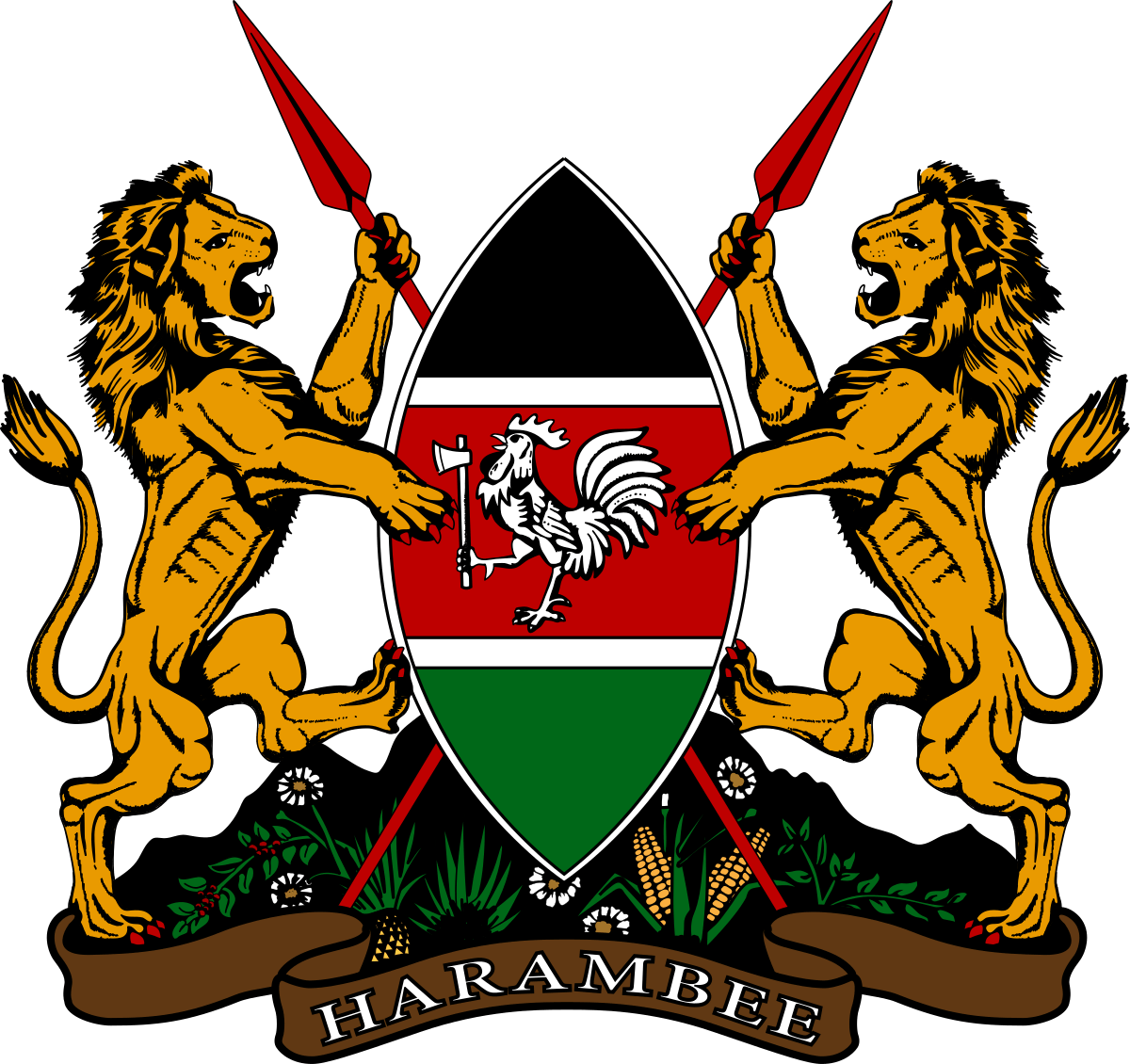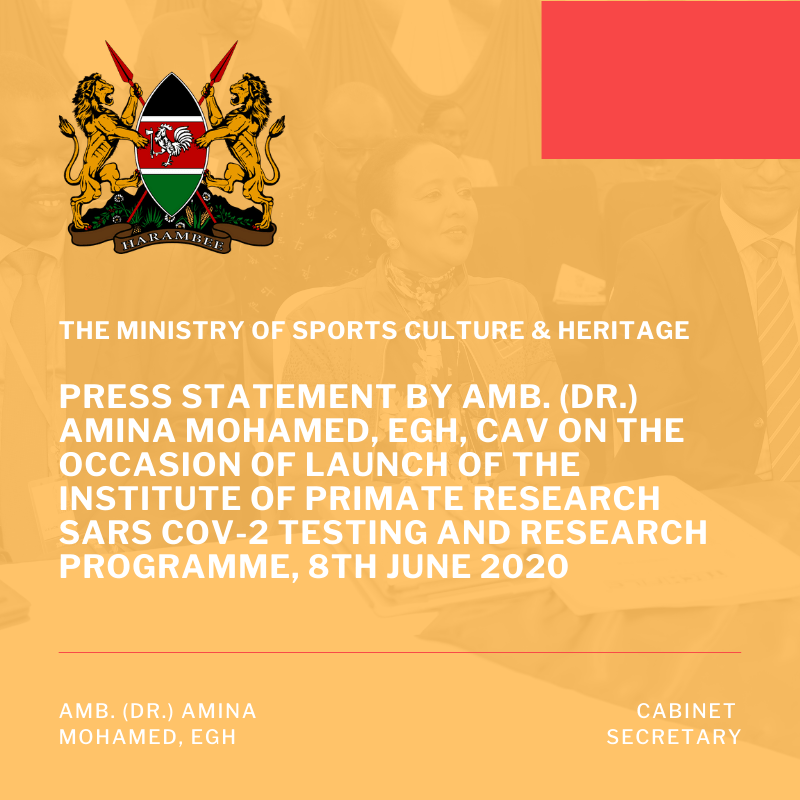Press Statement By Amb. (Dr.) Amina Mohamed, Egh, Cav On The Occasion Of Launch Of The Institute Of Primate Research Sars Cov-2 Testing And Research Programme, 8th June 2020
- The Institute of Primate Research (IPR) is an institution under the National Museums of Kenya and the State Department for Culture and Heritage established in 1958 to study monkey behaviour as a model for human evolution.
- Since inception, the mandate of the institute has expanded to include biomedical research leading to new knowledge, development of vaccines, drugs and medical products for improved human health.
- The current mission of the institute is to undertake basic, preclinical and translational research leading to human health products, services, technologies and biodiversity management
- Equipped with 160 scientific and 90 support staff, IPR has human resource capacity in vaccine and drug development, disease diagnosis, virus research, one health (human-wildlife-livestock diseases) research, and snake anti-venom control.
- It also has advanced infrastructural capacity including health research labs, three animal hospitals, key diagnostic equipment, rodent, rabbit and monkey houses, herpaterium for snakes, incinerator and standby power generator and ICT broad band connection.
- With these resources, the institute has been conducting; biomedical and translational research to generate knowledge for developing drugs, vaccines and medical products, pre-clinical trials for vaccines, drugs and medical devices using non-human primate animal models, zoonotic diseases surveillance and mapping their hot spots serving as early warning systems. IPR also runs a large research animal holding and breeding facility with international accreditation and focused research on infectious and non-communicable diseases, biodiversity and laboratory animal science.
- The institute is registered by the National Commission for Science Technology and Innovation (NACOSTI) as a National basic biomedical research institute. It is also an International Research Centre of repute, collaborating with renowned institutions such as WHO, UNESCO, FAO, DFID, USAID, science foundations, universities and local scientific institutions accredited by the American accreditation body (AAALAC) as a world-class research animal holding facility.
- As a core contributor to the Big Four Agenda in the area of Universal Health Coverage, IPR which is an African Network for Drugs and Diagnostics Innovation (ANDI) designated centre of excellence for pre-clinical drug and diagnostics which promotes African-led product Research, Development and Innovation and has achieved the following:
- Controlled the snake bite disease in the Counties of Kitui, Baringo and Samburu. It is home to the first regional snake anti-venom control and testing centre, fighting snakebite disease and preventing thousands of deaths and has developed motorized ambulances for snake manifested areas to transport snake-bite victims.
- Conducted coronavirus surveillance and mapping in animals and humans across the country.
- Carried out research in corona virus, zika, plasmodium, yellow fever, dengue and chikungunya.
- Developed smugel, smuscan, unipron, motorized snakebite ambulances, diabeton, Chai laparoscopic technique, and whole uterine transplant technology contributing to enhanced maternal and reproductive healthcare.
- Tested numerous drugs and vaccines and developed and optimized non-human primate models for research in human diseases including, malaria, schistosomiasis, leishmaniasis, Human African Trypanosomiasis, endometriosis, HIV, dengue fever, diabetes, alzheimer’s disease, stroke etc.
- An accredited animal research ethics trainer in practical skills for biotechnology and biomedical science students.
- Developed diagnostic techniques for e.g. Sleeping sickness (Human African Trypanosomiasis), DNA barcoding for endangered wildlife with expertise in in vitro fertilization technology (assisted reproductive technology) important for fertility and preservation of endangered species.
- Mentored over 1000 health research professionals.
- Breeding rodents, rabbits, snakes and monkeys for health research.
- Coordinates the National Primate Taskforce for primate conservation.
- Developed the National Laboratory animal science guidelines.
- Centre for scientific validation of traditional medicine and natural products.
- Initiated the Bateriophage research programme using phage technology as alternatives to antibiotic resistance.
- Developed a robust research regulatory programme for laboratory animal welfare and research ethics review.
- Conserves over 450 acres of forest land for optima retention of research biodiversity.
- Based on their expertise, IPR will support the Ministry of Health in COVID-19 response efforts through:
- Molecular detection and testing of COVID-19. We have put in place infrastructure to process 300 samples per day for the next 90 days. This process will be managed by two personnel shifts of 12 hours per shift daily. This process will enhance mass testing power to ascertain the spread of COVID-19 in Kenya.
- Serological testing to ascertain the recovery rates within the population with a view to informing key economic re-operationalization decisions.
- Collaboration with KEMRI and other institutions in training, vaccine development and drug repurposing against COVID-19.
- Research using animal models to understand COVID-19 disease progression and dynamics in humans and progression of research tools such as DNA libraries to support COVID-19 research.
- In the long-term and based on IPR’s strong credentials in bio-medical animal capacity, we aim to develop an animal (monkey) model to evaluate homegrown solutions to COVID-19 including natural product research and modern vaccine development. The advancement of an appropriate animal model for COVID-19 will also enable the evolution of intervention measures including vaccines and other therapeutics which will help in charactering COVID-19 and other families of coronaviruses (known to cause disease to humans) pathology parameters to be used for vaccine testing in Africa.
Download Below

